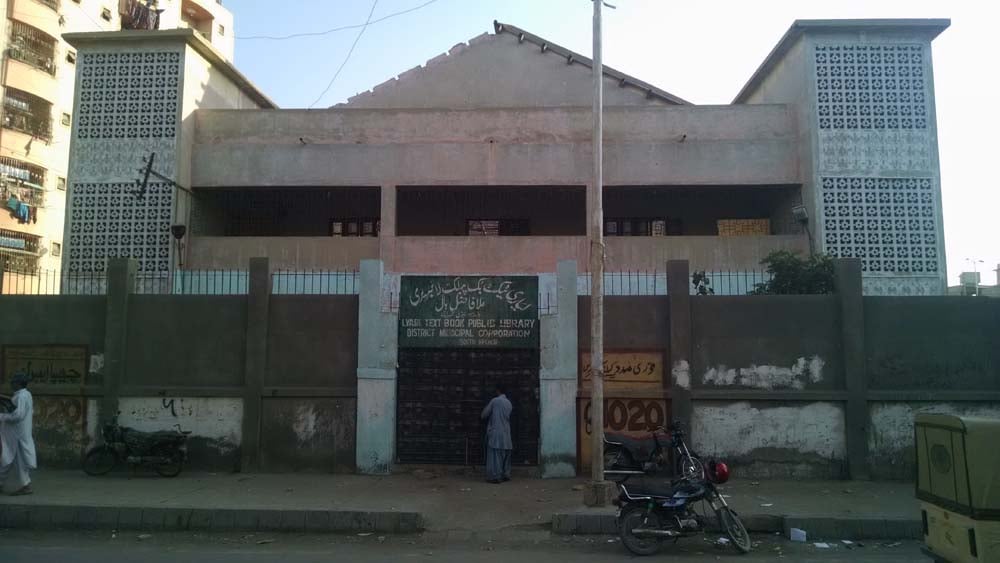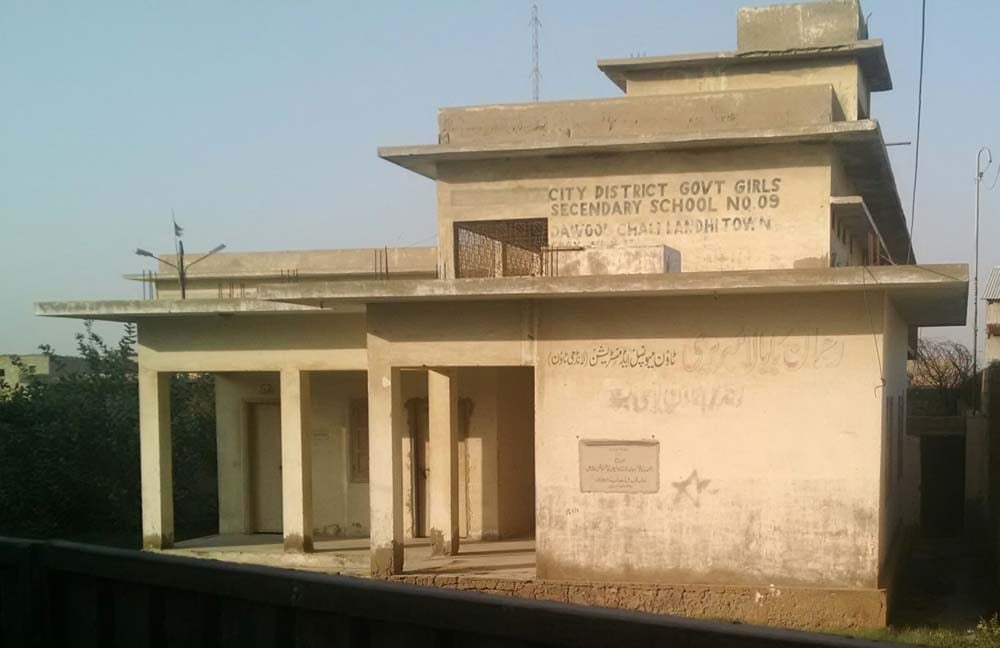The vanishing municipal libraries of Karachi
KARACHI: Public libraries are the centres of art and literature in cities across the world – a hub of affordable and readily accessible knowledge for students, researchers and book lovers alike. But sadly, public libraries in Karachi have been suffering from decades of official neglect so much so that they have started to resemble crumbling, ancient ruins instead.
A weeks-long thorough look by The News at the city’s municipal libraries that exist in official records shows a startling picture of the sad state of affairs. This is happening at a time when there is an increasing public emphasis on ensuring the availability of free spaces for educational, recreational and social activities.

Political parties, which have in the past fought over amenity plots, lands allocated for parks, playgrounds and other public utilities, have shown criminal negligence on the part of preserving, protecting and maintaining already-built facilities like libraries.
Case in point, the Al-Firdous Public Library at Chandni Chowk, Baldia Town, which was built in the mid-1980s when Abdul Ghafoor Awan and Ashraf Awan, both belonging to Jamaat-e-Islami, were elected as councillors in local government elections.
The library was inaugurated by the late Abdus Sattar Afghani, then the mayor of Karachi. Because of its close proximity with the Al-Firdous Mosque located on Guldad Shah Road, the library was named Al-Firdous Public Library.

In the early 2000s the office of Union Council 6 (now Union Committee No 32) was moved into the library, shrinking its space. Later, with the opening of a National Database Registration Authority facility, the construction work took over almost all the library space, leaving only a dark corner to store broken bookshelves and books covered with dust.
The NADRA office was shut down a few years ago after allegations of irregularities. However, the books and shelves are still sharing that tiny corner with wheelbarrows and spades and other equipment used by the sanitation staff.
Masood Khan, a software engineer from Shamozi Mohalla, reminisces the years when he was a student and visited the library. There were copies of all the monthly magazines for children and there was no need to register, you could just sit and read, he said, adding the library was a huge draw for older people too who would come in the evening to read newspapers.

“Recently a cousin who loves Urdu literature was visiting from my ancestral town and I suggested to him to go to Al-Firdous library which I remembered was a treasure trove of books on religion, poetry, politics and literature,” said Khan. “But to his sheer disappointment, the books were in dismal condition and there was no reading room available.” Junaid Ali, a Karachi University student lamented that with the present state of the library, there was no other place in the entire locality of Baldia Town where he could go to study. “The nearest library in the entire district west is Haali Library in Block L of Orangi Town,” he said. “That too has a limited number of books. I have to travel a long way to North Nazimabad for Taimooria Library.”
Official neglect
The dismal state of libraries is not just limited to Baldia Town or District West. Municipal libraries across the city paint a similar picture. Some have in fact even gone missing over past decade.
The Jigar Muradabadi Library in Paposh Nagar, Nazimabad in District East adds to the depressing tale of such lost social spaces.
It was inaugurated in 1988 by Muttahida Qaumi Movement-Pakistan head Farooq Sattar, who was mayor back then. Later in 1997, it was renovated by the late MQM leader Shoaib Ahmed Bukhari who was the provincial labour minister then.
Once it used to be home to thousands of books, but only a miniscule 300 of them are left now while an old decrepit building and broken chairs await visitors. Until very recently, the building was being used for political activities and by municipal workers.
In District South, the Lyari Textbook Public Library has a similar tale of neglect. The ceiling at one of its end has caved in; no repair efforts have been made so far while the administration of union council 10 continues to use the library space as an office.
Meanwhile, the library at Ranchor Line does not even exist anymore. The local administration has taken over the building and where the books and other reading materials ended up remains a mystery.
Similarly, Hasrat Mohani Library in District Central, inaugurated in 1985 and renovated in 2017 by the district’s chairman Rehan Hashmi, has assigned the library hall to the union council administration and visitors are left with no space for reading.
In District Malir, Khushal Khan Khattak Library in Future Colony, which was inaugurated by former mayor Naimatullah Khan, has become a hideout for drug peddlers. Drug addicts have stolen not only the precious books, but even the windows, doors and fans as well.
Rehman Baba Library and Karnal Sher Khan Library in the locality also tell the same tale.
Libraries have always come under the domain of the city administration, according to Syed Saif Abbas Hasani, a senior director at Karachi Municipal Corporation’s (KMC) sports, culture and recreation department.
However, Hasani said, since local bodies elections were not held for several years, the performance of municipal bodies continued to decline. Moreover, as the provincial government continued to induct bureaucrats into municipal offices on the basis of favouritism, the state of municipal facilities went from bad to worse because these officials had no concerns for public utilities such as libraries.
The plight of librarians
This state of affairs can perhaps be most troubling for none other than librarians, the people whose love for books and reading brought them into a profession that is rapidly being replaced with ever-evolving technology and easily accessible virtual knowledge repositories.
Talat Shakil, the chief librarian of DMC East, admits that libraries under her charge lack some very important facilities, but insists that the readership ratio in her area is better as compared to libraries that come under other district municipal corporations (DMC).
She said that even though there is a lack of qualified staff at libraries, she was still hopeful that things will get better with time.
Arifa Tariq, the chief librarian for DMC Korangi said the facilities were in urgent need of funds allocation from the authorities – some need repairs, while others need new furniture, lighting system and addition of new books. According to her, the lack of a budget is the biggest hurdle in carrying out meaningful restoration of libraries. Authorities take too long to approve the proposals sent by librarians, she said, adding that readers would benefit if the government starts allocating funding for libraries.
Not a new story
Despite all these issues, librarians continue to work in what can only be described a frustrating and demotivating environment.
Syed Najma Sultana, a retired librarian and an executive of the Pakistan Library Association, said the lack of budget for maintenance, purchasing books and other fixtures has been a perennial issue faced by librarians especially in the public sector.
“I worked at municipal libraries for years. Sadly, librarians do not get the respect they deserve,” Sultana said. “Library staff are, in most cases, deprived of their salaries, and don’t have enough resources for managing the libraries properly.”
She added that librarians are appointed in grade 12, which is a low grade for someone who may have a master’s degree in Library Science, while other government officials with a master’s degree or similar qualification are appointed in grade 17.
“This is discrimination and such attitude of the government has created disappointment among librarians which is why some of them are not performing up their mark,” she argued.
She said that PLA has been working to ensure that librarians get quality professional education and also their rights. With the focus growing on the need for quality public spaces, there is an urgent need for the government to focus on making funds available to save the existing lot.

KMC
1. Khaliq Dina Hall & Library
2. Frere Hall Library
3. Faizi Rahmeen Library
dmc east
4. Gulshan-e-Iqbal Library
5. Khwaja Shafi Dehlvi Library
6. Allama Iqbal Library
7. Abdur Rab Nishtar Library
8. Akhtar Colony Library
dmc west
9. Firdous Library
10. Shah Abdul Latif Bhitai Library
11. Hali Library
DMC central
12. Sohaib Akhtar Library
13. Allama Shabir Usmani Library
14. Al-Huda Library
15. Prof Karar Hussain Library
16. Hasrat Mohani Library
17. Naseerabad Library
18. Karnal M. Khan Library
19. Taimuria Library
20. Jigar Muradabadi Library
21. Hakim M. Hassan Library
22. Umer Khan Library
DMC South
23. Lyari Textbook Library
24. Frere Market Library
25. Iqbal Shaheed Library
26. Hingarabad Library
27. Sardar A. Rab Nishtar Library
28. Syed M. Din Library
29. Rangiwara Library
30. Faiz -e- Aam Library
31. Satellite Library
32. Umer Lane Library
33. Iqra Library
34. Mujahid Park Library
35. Nawa Lane Library
36. Shohaday-e-Pakistan Library
37. Hasrat Mohani Library
38. Ranchorline Library
DMC KORANGI
39. Muhammad Ali Johar Library
40. Sir Syed Library
41. Maulvi Abdul Haq Library
42. Fatima Jinnah Library
43. Allama Shah A. Norani Library
44. Central Library
45. Iqra Library
46. Mufakkir-e-Islam Library
47. Maulvi Syed Nazeer Husain
48. Shah Faisal Library
49. Muhammad Ali Jinnah Library
Lack of facilities in all libraries
•Heaps of garbage can be seen in the premises
•Clean drinking water is not available
•New furniture not purchased for the last 10 years
•Unpaid dues causing power outages
•Lights and fans are not installed or are damaged
•Toilets are not available for visitors
Map credit: Faraz Maqbool
-
 Victoria Wood's Battle With Insecurities Exposed After Her Death
Victoria Wood's Battle With Insecurities Exposed After Her Death -
 Prince Harry Lands Meghan Markle In Fresh Trouble Amid 'emotional' Distance In Marriage
Prince Harry Lands Meghan Markle In Fresh Trouble Amid 'emotional' Distance In Marriage -
 Goldman Sachs’ Top Lawyer Resigns Over Epstein Connections
Goldman Sachs’ Top Lawyer Resigns Over Epstein Connections -
 How Kim Kardashian Made Her Psoriasis ‘almost’ Disappear
How Kim Kardashian Made Her Psoriasis ‘almost’ Disappear -
 Gemini AI: How Hackers Attempt To Extract And Replicate Model Capabilities With Prompts?
Gemini AI: How Hackers Attempt To Extract And Replicate Model Capabilities With Prompts? -
 Palace Reacts To Shocking Reports Of King Charles Funding Andrew’s £12m Settlement
Palace Reacts To Shocking Reports Of King Charles Funding Andrew’s £12m Settlement -
 Megan Fox 'horrified' After Ex-Machine Gun Kelly's 'risky Behavior' Comes To Light
Megan Fox 'horrified' After Ex-Machine Gun Kelly's 'risky Behavior' Comes To Light -
 Prince William's True Feelings For Sarah Ferguson Exposed Amid Epstein Scandal
Prince William's True Feelings For Sarah Ferguson Exposed Amid Epstein Scandal -
 Nick Jonas Gets Candid About His Type 1 Diabetes Diagnosis
Nick Jonas Gets Candid About His Type 1 Diabetes Diagnosis -
 King Charles Sees Environmental Documentary As Defining Project Of His Reign
King Charles Sees Environmental Documentary As Defining Project Of His Reign -
 James Van Der Beek Asked Fans To Pay Attention To THIS Symptom Before His Death
James Van Der Beek Asked Fans To Pay Attention To THIS Symptom Before His Death -
 Portugal Joins European Wave Of Social Media Bans For Under-16s
Portugal Joins European Wave Of Social Media Bans For Under-16s -
 Margaret Qualley Recalls Early Days Of Acting Career: 'I Was Scared'
Margaret Qualley Recalls Early Days Of Acting Career: 'I Was Scared' -
 Sir Jackie Stewart’s Son Advocates For Dementia Patients
Sir Jackie Stewart’s Son Advocates For Dementia Patients -
 Google Docs Rolls Out Gemini Powered Audio Summaries
Google Docs Rolls Out Gemini Powered Audio Summaries -
 Breaking: 2 Dead Several Injured In South Carolina State University Shooting
Breaking: 2 Dead Several Injured In South Carolina State University Shooting



